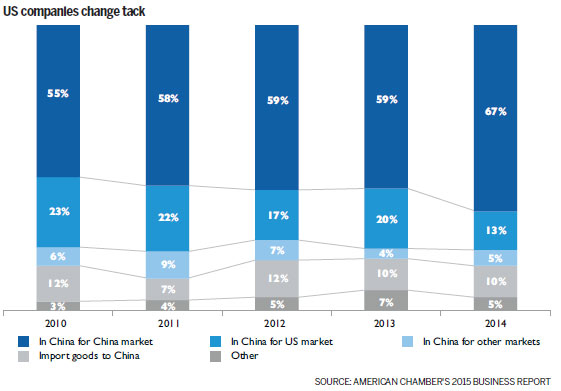Firms urged to adapt to local market
Updated: 2015-04-10 12:19
By Yu Ran in Shanghai(China Daily USA)
|
|||||||||||
|
Kenneth Jarrett, president of AmCham Shanghai, says US companies like GM are already tailoring their products to local tastes. [Gao Erqiang / China Daily] |
AmCham Shanghai says domestic consumption patterns are forcing change, but US companies keep positive outlook on China despite slowdown
American firms should adapt their products to suit local tastes if they are to prosper in China as consumers increasingly switch to domestic brands, according to the American Chamber of Commerce in Shanghai.
"US companies are trying to learn more about Chinese consumers on how they shop, what they look for, and to make sure they adjust their products to meet those needs," said Kenneth Jarrett, president of AmCham Shanghai.
Showing a degree of foresight, a number of US companies in China have already localized. GM changed the design of some of its rear seats to make the driving experience more comfortable for passengers, while Oreo Cookies taste different in China to appeal more to the Chinese palate.
Many US companies are now pursuing an "in China for China" strategy, according to the chamber's 2015 China Business Report, which was released early last month.
Some 67 percent said their top priority in China is to produce or source goods or services for the China market - a record high.
To support this, companies are continuing to design unique products and services for the China market, with 72 percent of respondents answering to this effect.
"My advice for forthcoming US companies is to be aware of what is different about consumers here. You can't assume that the product you have in the US has the same attraction here, so you need to adjust it," Jarrett told China Daily.
The central government has been trying to encourage domestic spending as it shifts gears to a consumption-led economy. China's retail sector has seen an average growth rate of 12 percent in the last couple of years in terms of domestic spending.
"Although the growth in domestic consumption is obvious, the consumer behavior in China on luxury brands is getting more general with almost everyone on the streets in Shanghai wearing designer labels," said Jarrett.
More Chinese are also flying overseas to shop in search of cheaper prices, he added.
In general, AmCham Shanghai's members were optimistic about the Chinese market despite the economic slowdown.

Almost half of the respondents (44 percent) expect to see positive growth in their business here over the next five years. Almost the same share estimated that annual growth in their primary market sector will range from 6 to 10 percent.
"US companies still feel very optimistic about the opportunities here, but are trying to adjust their business plans and deal with challenges on managing the margins of the businesses, like how to be efficient, so they can continue to be profitable," Jarrett said.
With so much foreign capital flowing into the country, the central government is preparing to open the door even wider.
The National Development and Reform Commission and the Ministry of Commerce last month released a new version of the Catalog for the Guidance of Industries for Foreign Investment, which governs restrictions on investment from abroad. The previous version was issued in 2011.
The new catalog, which is due to take effect on April 10, will greatly widen market access for foreign investors. The number of restrictions on foreign investment will be reduced to 38 items from the current 79.
With the latest deregulation, China's manufacturing industry is almost fully open to foreign investors. Companies that make chemicals, medicines and construction machines are expected to be the largest beneficiaries.
Foreign investors' access to China's booming Internet industry is also getting wider. They will now be able to set up e-commerce businesses without having to form a joint venture with a Chinese company.
"More Chinese consumers rely on social media and e-commerce, which will be a competitive but promising market for foreign companies to start-up with," said Jarrett.
yuran@chinadaily.com.cn
Related Stories
China denies wrestling with US in Latin America 2015-04-10 21:39
China vows stronger co-op with Sweden in environment 2015-04-10 20:49
China appoints senior officials 2015-04-10 16:14
Man stands trial for fatal bus fire in SW China 2015-04-10 14:46
Today's Top News
Failed developer shoots dead 3, injuries 2 in Milan
Creating climate change solutions through entrepreneurship
Tremendous opportunities created for Dutch businesses in China
Belgium's mixed signals to China
Putin backs China's Silk Road proposal
Boston bomber convicted, may face death penalty
Zhou trial likely to serve as model
Belarus to expand trade and economic ties with China
Hot Topics
Lunar probe , China growth forecasts, Emission rules get tougher, China seen through 'colored lens', International board,
Editor's Picks

|

|

|

|

|

|







